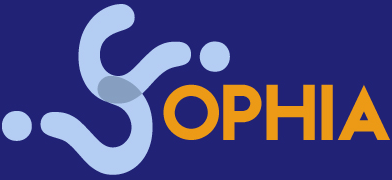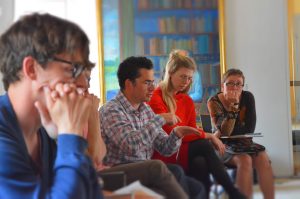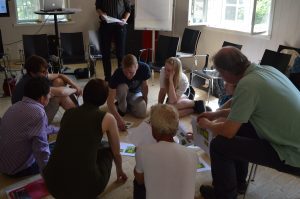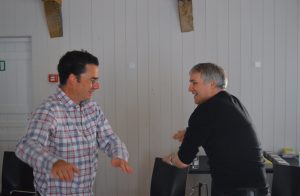Despite being involved in P4C for ten years, I was a SOPHIA first-timer. I’m rather wary of going to P4C conferences, because, like Goldilocks, I am rather fussy. Often, this paper is too theoretical, and I can’t see how it will connect to my practice; and that paper is about the basics of P4C without bringing anything new, so I don’t think it will help me grow.
This Network Meeting, on the other hand, was “just right”. There were sessions that drew stimuli from unexpected sources, such as the #thuglife video series; there were demonstrations of facilitation techniques that I hadn’t experienced before, such as Peter Worley’s “hokey-kokey” method; and there were sessions exploring problems which anyone who works in this field will encounter in one form or another, but with fresh insights. We were in Hans Christian Andersen’s home city of Odense, and I particularly enjoyed Caroline Schaffalitzky’s exploration of how to use his stories or other canonical texts that every child knows, without either succumbing to the recitation of the established “moral of the story” or abandoning the text and using it for mere question generation.
The particular value of the sessions was that they were accessible to people who were new to P4C, but were original and specific enough to be of use to people like me who have been doing this for years. I was able to refresh my own practice and take away new ideas to share with the teachers I train.
Something that has become a go-to for me (partly because it works so well at deepening thinking, and partly because it such good fun) is a development a concept shared by @philozoo. At various events, their “Philonauts”, alien visitors to earth, asked children and adults to explain, “What is a human?” Since then, I’ve taken to occasionally arriving in classes as “C3327X”, a robot who understands English but has not been programmed to understand right from wrong, and needs the children’s help to learn. I’ve done facilitator-in-role stuff before, but what was new and delightful was the practice of being very obtuse, so that the children have to explain everything with meticulous accuracy, and be precise about counterexamples to their claims. For example, if they give the rule, “You must never hit someone,” we may end up exploring the exception of boxing, which does not involve boxes, and takes place in a ring, which is not round, as they have to explain, patiently, to “the robot”.
Because of the intimacy of the event, with everybody in the same room rather than having parallel sessions, we really were a community for the event, with all the practical and intellectual benefits that brings. Themes emerged and were developed, and some humorous asides took on a repeating life of their own which made for a convivial atmosphere. The breaks were as useful as the sessions, too, and I was able to forge new contacts which have already led to translations into Italian and Danish of some of my materials, and to other prospective projects.
For anyone considering contributing a paper or workshop next year, you will probably have something suitable if you find you have things to say in response to these questions:
- What’s different about this?
- What can be imitated or transferred into other people’s practice?
- What questions about this approach remain to be answered?
Sessions that worked well in this meeting were:
- Something that takes P4C and applies it in an unusual way, or in an unusual setting.
- A twist in how to facilitate or structure an enquiry which can be demonstrated.
- A problem you’ve come across about the practice or ethics of doing P4C, on which you have some thoughts but not necessarily a definitive solution
- A work-in-progress for something you have been experimenting with, that seems to be working, but which it would be interesting to share and refine.
- A technique from a “neighbouring pedagogy” that has some overlap with P4C but which can also bring something new.
I found myself in the final, dwindling group of “stayers-out”, gathered after dinner to enjoy a final companionable evening after a successful event. After we’d said our goodbyes until next year, as I was walking back to my hotel I passed another little knot of people about to part. I heard one say, “See you next year – or probably before. It’s a small world, the circus.”
I rather like the thought of all these eccentric chapters of human culture having their get-togethers in different cities around Europe, returning to their own countries with new enthusiasm, and knowing that next year there will be another gathering. I certainly look forward to my next SOPHIA.
Register for SOPHIA Network Meeting 2019 in Galway, Ireland 1st and 2nd June: SOPHIA 2019
Call for Proposals for 2019 meeting (deadline February 28th): Call for Workshops
Jason Buckley



